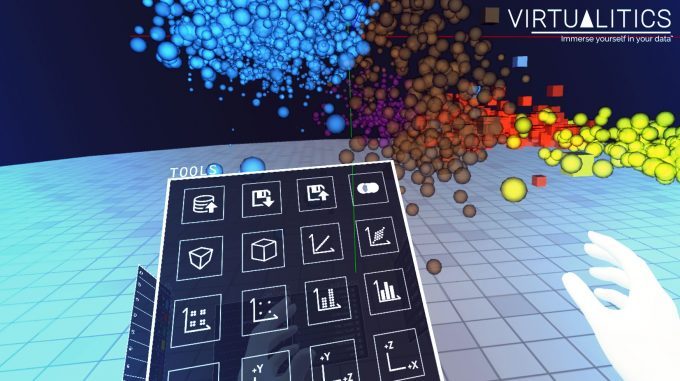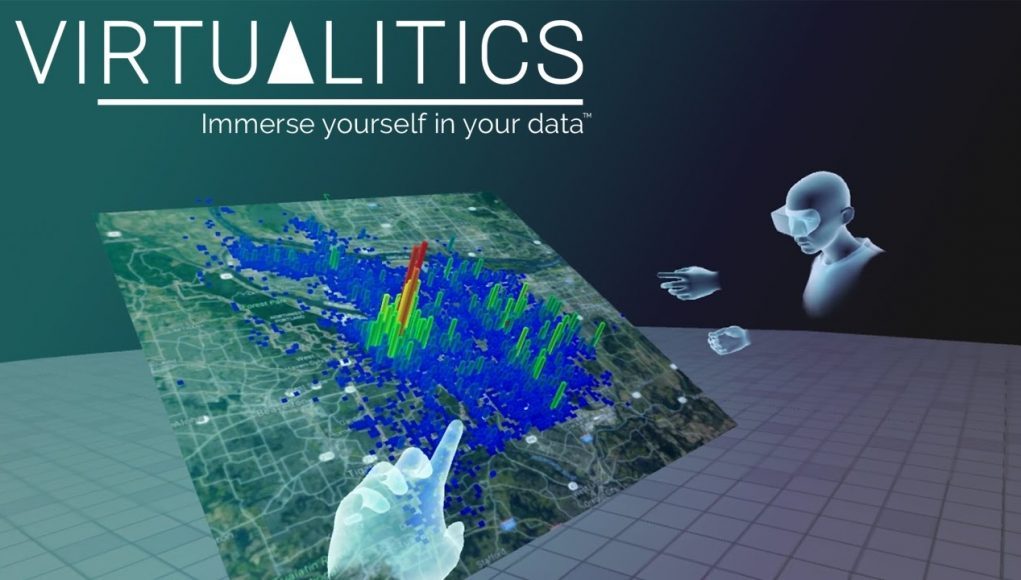Virtualitics is new company started by NASA JPL and Caltech alum. offering a new platform to leverage the immersive properties of virtual reality in order to better aid human comprehension and use of ‘Big Data’.
You’ve likely heard the term ‘Big Data’. Despite the phrase being coined perhaps as early as the mid nineties, with information now collected on an ever increasing number of aspects in our daily lives and beyond you’ll likely have heard it mentioned a lot more in recent years. The term is, in a way, unhelpfully generic, but it’s become useful to act as a colloquialism for the vast, virtual data-scapes constructed from aspects which touch every part of our daily lives.
But what to do with all of this information? That’s a good question of course, and there are many around the world tasked with mining different data sources in order to extract previously obfuscated insights into complex problems and behaviours. But a new tool from Virtualitics – a new company formed by NASA JPL and Caltech alum. – aims to instead answer a different question: How do we visualise these vast, multi-dimensional data sets in a way which allows us mere humans to better extract those insights?
“Big Data is worthless if we cannot extract actionable knowledge from it,” said Michael Amori, CEO of Virtualitics. “Visualization can reveal the knowledge hidden in data, but traditional 2-D and 3-D data visualizations are inadequate for large and complex data sets. Our solution is to visualize as many as 10 dimensions in VR/AR all via a Shared Virtual Office, which allows even untrained users to spot patterns in data that can give companies a competitive edge.”
Virtualitics’ new virtual reality data visualisation platform claims a pedigree of over a decade of research from NASA (Jet Propulsion Laboratory) and Caltech (California Institute of Technology). It aims to utilise the naturalistic way in which people can interact with virtual objects in VR and to assist comprehension and perception by displaying that data in new and interesting ways.
According to professor George Djorgovski, renowned astrophysicist and founder of Virtualitics: “VR is intrinsically well-suited for human perception, intuition and pattern recognition, leading to insights that may be difficult or even impossible to gain through any traditional visualization technique. It is a natural environment for collaborative visual data exploration and data analytics that enables teams of users, who may be continents apart, to interact with the data and with each other in a shared virtual space. It may also be a natural environment where humans can interact with their artificial intelligence assistants.”
 Virtualitics also provides a business oriented social space, which allows colleagues from around the world to meet inside the same virtual space and speculate and collaborate on these large, multi-dimensional data-sets in real time.
Virtualitics also provides a business oriented social space, which allows colleagues from around the world to meet inside the same virtual space and speculate and collaborate on these large, multi-dimensional data-sets in real time.
The new company has also just announced that it has closed a $3M seed round from angel investors in order to develop its technology further.
It’s certainly an interesting project, and another example of the potential of VR outside of the entertainment sphere. However there may be a risk such a project suffers being viewed as a case of The Emperors New Clothes by those now used to their efficient two dimentional, spreadsheet driven world. And in truth, the benefits these new forms of visualisations may offer won’t fully be understood until systems like this have been put to use in the real world for many years. However, as someone who has constantly noted the stark and astonishingly different perspectives VR can offer, I’m inclined to think that there may well be something in Virtualitics







